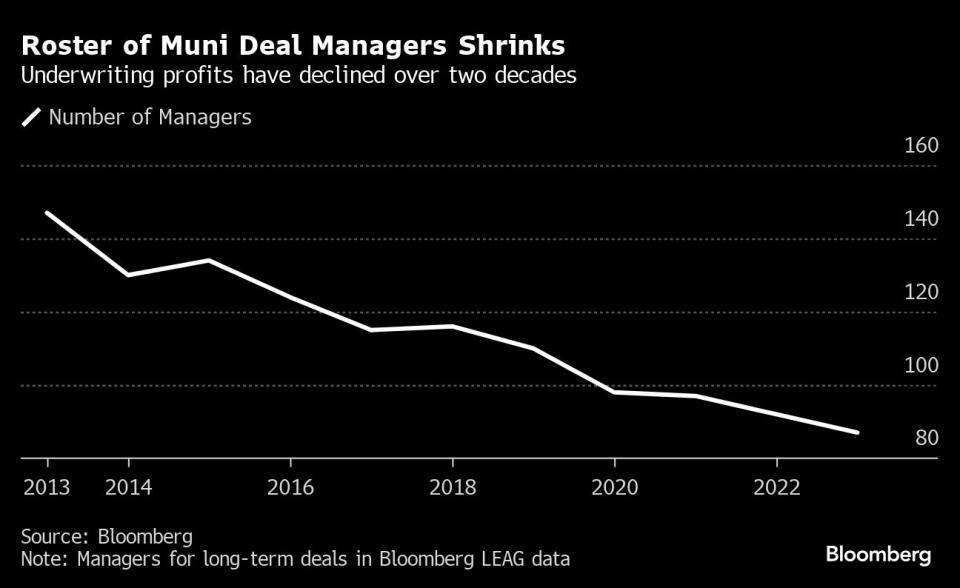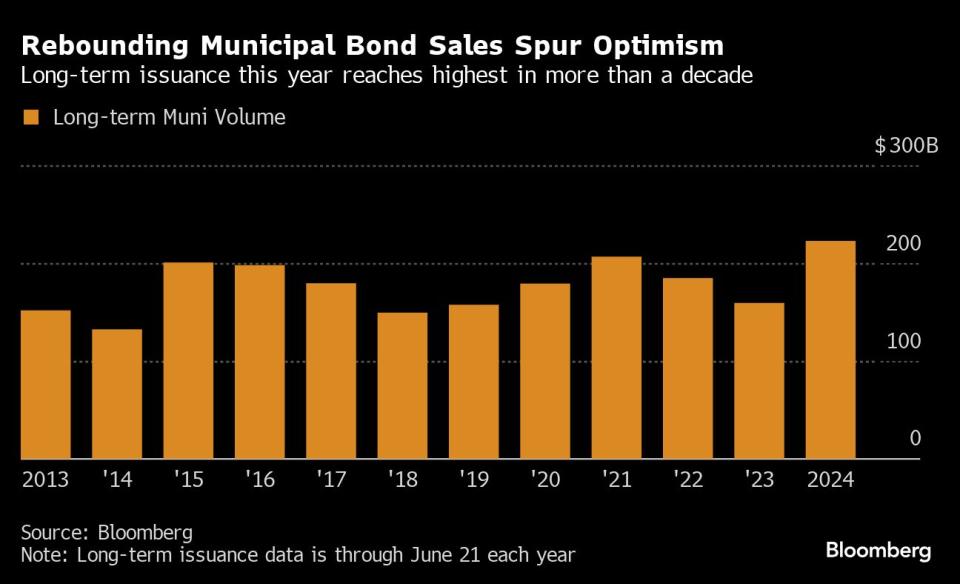Citigroup, UBS Exit Munis After Market’s Profits Plummet by 50%
(Bloomberg) -- Making money in the $4 trillion municipal bond market is harder than ever after a two-decade long drop in underwriting markups pinched bottom lines, contributing to pullback by major Wall Street firms such as Citigroup Inc. and UBS Group AG.
Most Read from Bloomberg
How Long Will High Rates Last? Bond Markets Say Maybe Forever
Russia Is Storing Up a Crime Wave When Its War on Ukraine Ends
CDK Hackers Want Millions in Ransom to End Car Dealership Outage
Dubai Real Estate’s Resilience May Signal End of Boom-Bust Cycle
Profits for municipal underwriters fell by 30% to 50% from 2005 to 2023, according to a report to be presented next month at the Brookings Institution’s municipal finance conference.
Researchers analyzed more than 2 million state and local bonds and markups on 12.4 million new issue trades. They found a wider pool of institutional investors and improvements in disclosure have compressed underwriting spreads, or the profit banks make marketing bonds to buyers. They also found that the squeeze was more acute for national underwriters.
The departures of Citi and UBS show challenges in a corner of Wall Street that finances infrastructure like roads, bridges and schools. The exits sparked concern about losses of banks with large balance sheets and massive distribution arms, which could lower financing options and drive up borrowing costs for local governments in the long-run.
“It’s important for underwriters to understand the entry and active dynamics, because that influences their margins and it influences the health of the market,” Christos Makridis, one of the authors of the report and an associate research professor at Arizona State University, said in an interview.
“A healthy municipal finance sector is really critical and so understanding what gives rise to a healthy municipal finance sector is kind of a first order requirement,” he said.
Read: Citi Shuts Down Muni Business That Once Was Envy of Rivals
Despite political tensions between Wall Street and some governments over environmental and social policies, the researchers said the pullbacks were likely profit-driven, and were unrelated to state policy, according to the report, which was led by Makridis, Christian Lundblad of the University of North Carolina at Chapel Hill, John Hund of the University of Georgia, and Giang Nguyen of Pennsylvania State University.
Shrinking profit margins have coincided with an industrywide consolidation. The number of underwriting firms in the market dropped to 87 last year, down 41% from a decade earlier, according to data compiled by Bloomberg.
Two years of lackluster issuance in 2022 and 2023 amid rising interest rates may have pushed margins to a threshold too low for some firms to withstand, said Justin Marlowe, a professor at the University of Chicago Harris School of Public Policy.
Governments are concerned about potentially losing their banking partners. While the market currently offers enough underwriting capacity, Atlanta Chief Financial Officer Mohamed Balla wonders if the market could reach a tipping point with additional departures.
“We need strong partners to help local governments efficiently and strategically deploy capital,” Balla said.
Often, governments are mandated to secure the lowest bids, but that is not always the best approach for bond pricing, said David Erdman, a managing director at Baker Tilly Municipal Advisors LLC, who over 30 years has overseen more than 300 municipal sales for Wisconsin. Providing more spread can incentivize underwriters to market bonds more broadly and should garner lower yields and better bond pricing, he said.
For now, amid a resurgence in issuance, smaller and regional firms are eager to expand and fill the holes Citigroup and UBS left. Long-term muni bond sales have gained 40% year-to-date to nearly $223 billion, according to data compiled by Bloomberg.
“It’s a very competitive market,” said Bill Reisner, co-head of fixed income for Janney Montgomery Scott, which is targeting higher margin sectors like project finance. “To compete you often try to compete on price and fees. We have seen that downward shift.”
Most Read from Bloomberg Businessweek
©2024 Bloomberg L.P.

 Yahoo Finance
Yahoo Finance 


